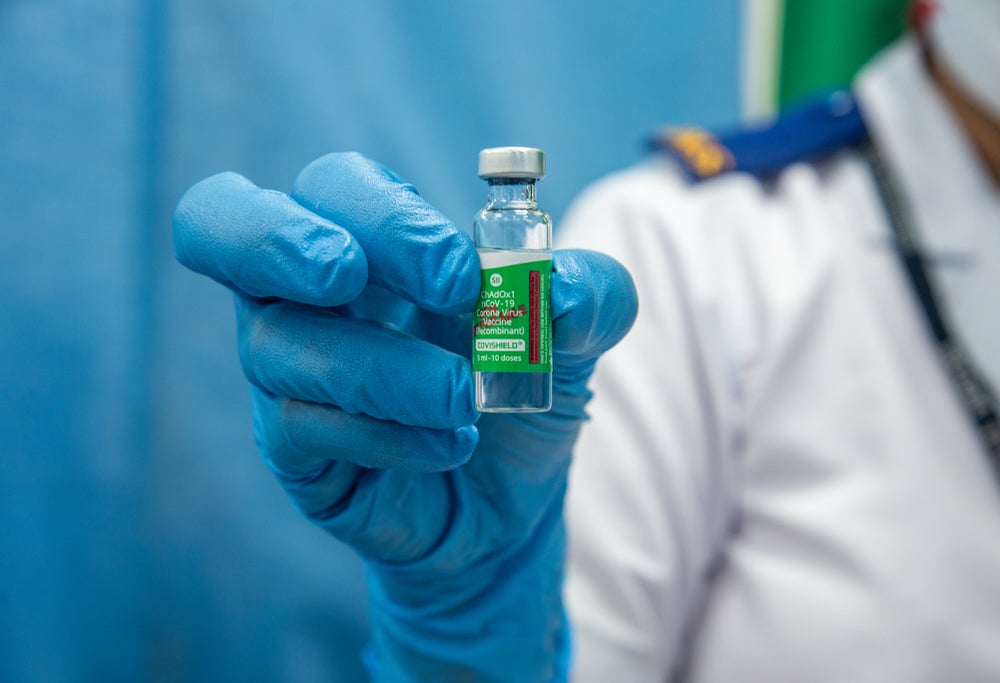
The world’s biggest vaccine producer has found itself under growing pressure to meet global Covid-19 jab delivery targets, after export restrictions were imposed by the Indian government in response to surging Covid-19 cases in the country.
The Serum Institute of India (SII) last year pledged to provide 550 million AstraZeneca (AZ) vaccine doses to 92 low- and middle-income countries under Gavi’s COVAX Facility, but the government’s instruction to prioritise domestic demand will see international deliveries of the AZ vaccine significantly delayed. The situation is particularly dire for Africa, where much of the vaccine supply was set to be delivered through COVAX.
India prioritises domestic demand for Covishield
At over 112 million doses so far, India has administered the most AZ shots – labelled there as Covishield – in the world. Despite the initial success of its vaccination programme, the country has since been overwhelmed by a second wave of the virus; some 200,000 Covid-19 cases have been reported daily in the country since 15 April, and at least five states are seeing severe vaccine shortages. India’s capital Delhi went into lockdown this week, with hospitals in the area reporting a lack of beds, oxygen and necessary medicines.
Back in February, SII CEO Adar Poonawalla tweeted an appeal for patience from those expecting vaccine deliveries: “Dear countries & governments, as you await #COVISHIELD supplies, I humbly request you to please be patient, [Serum Institute of India] has been directed to prioritise the huge needs of India and along with that balance the needs of the rest of the world. We are trying our best.”
This month, Poonawalla told Indian news outlet NDTV that despite restricting its vaccine output to India only, the manufacturer was “still short of being able to supply to every Indian”.
How well do you really know your competitors?
Access the most comprehensive Company Profiles on the market, powered by GlobalData. Save hours of research. Gain competitive edge.

Thank you!
Your download email will arrive shortly
Not ready to buy yet? Download a free sample
We are confident about the unique quality of our Company Profiles. However, we want you to make the most beneficial decision for your business, so we offer a free sample that you can download by submitting the below form
By GlobalDataUnder mounting pressure to meet both India’s target of 250 million people vaccinated by July and the institute’s international commitments, SII recently appealed to the government for funding to help ramp up its “very stressed” production capacity. According to a report by the Economic Times, the Indian government is set to grant the SII’s request of 30 billion rupees – which it hopes will be enough to boost production of the AZ vaccine from 70 million doses to over 100 million by the end of May.
Pressure mounts over SII’s international commitments
If demands from its own government weren’t enough, the SII was this month served a legal notice by AstraZeneca for failing to meet international vaccine delivery obligations.
Poonawalla told Business Standard: “I cannot comment on the legal notice as it is confidential, but we are examining all avenues to amicably manage and resolve legal disputes over contractual obligations that Serum Institute is not able to fulfil due to its prioritisation of Indian supplies.”
The difficult circumstances SII finds itself in have been compounded by a US ban on the export of raw materials needed to produce Covid-19 vaccines. In response to the pandemic, President Biden this year invoked the Defense Production Act, legislation that grants US vaccine makers priority access to specialised materials and equipment. While the act is helping manufacturers ramp up vaccine production efforts on American soil, it can result in shortages for companies making vaccines overseas.
Analysis by the Economist predicts that India will see production lines come to a halt in a matter of weeks unless the US provides a number of critical items, from vaccine ingredients to filters and plastic tubing used in manufacturing. In addition to AZ, SII is set to manufacture millions of Novavax jab doses in the coming months – so further production issues could mean strained relations with more than one pharma company.
Taking to Twitter last week, Poonawalla urged Biden directly to end the export ban:
Respected @POTUS, if we are to truly unite in beating this virus, on behalf of the vaccine industry outside the U.S., I humbly request you to lift the embargo of raw material exports out of the U.S. so that vaccine production can ramp up. Your administration has the details. ????????
— Adar Poonawalla (@adarpoonawalla) April 16, 2021
Reuters reported on Tuesday that the export restrictions could eventually be lifted following a discussion between foreign ministers from the US and India. According to a US official, Biden was considering India’s request to scrap the ban and would act upon it “at the earliest”.
As the biggest vaccine maker in the world, producing as many as 1.5 billion doses every year, SII is among the organisations best equipped to meet the unprecedented demands of Covid-19. Poonawalla even said in an interview with the Independent that it would be “relatively straightforward for [SII] to be able to handle” a situation like the pandemic. Now, with India facing the world’s worst surge in coronavirus infections, economically disadvantaged nations relying largely on SII for vaccines, and dwindling supplies of items essential to jab production, the manufacturer is facing more obstacles than it had predicted.
Interactive map designed by Ovanes Penchev. Click here for a more detailed look at inequalities in Covid-19 vaccine manufacturing capacity, courtesy of Investment Monitor.




